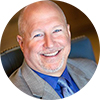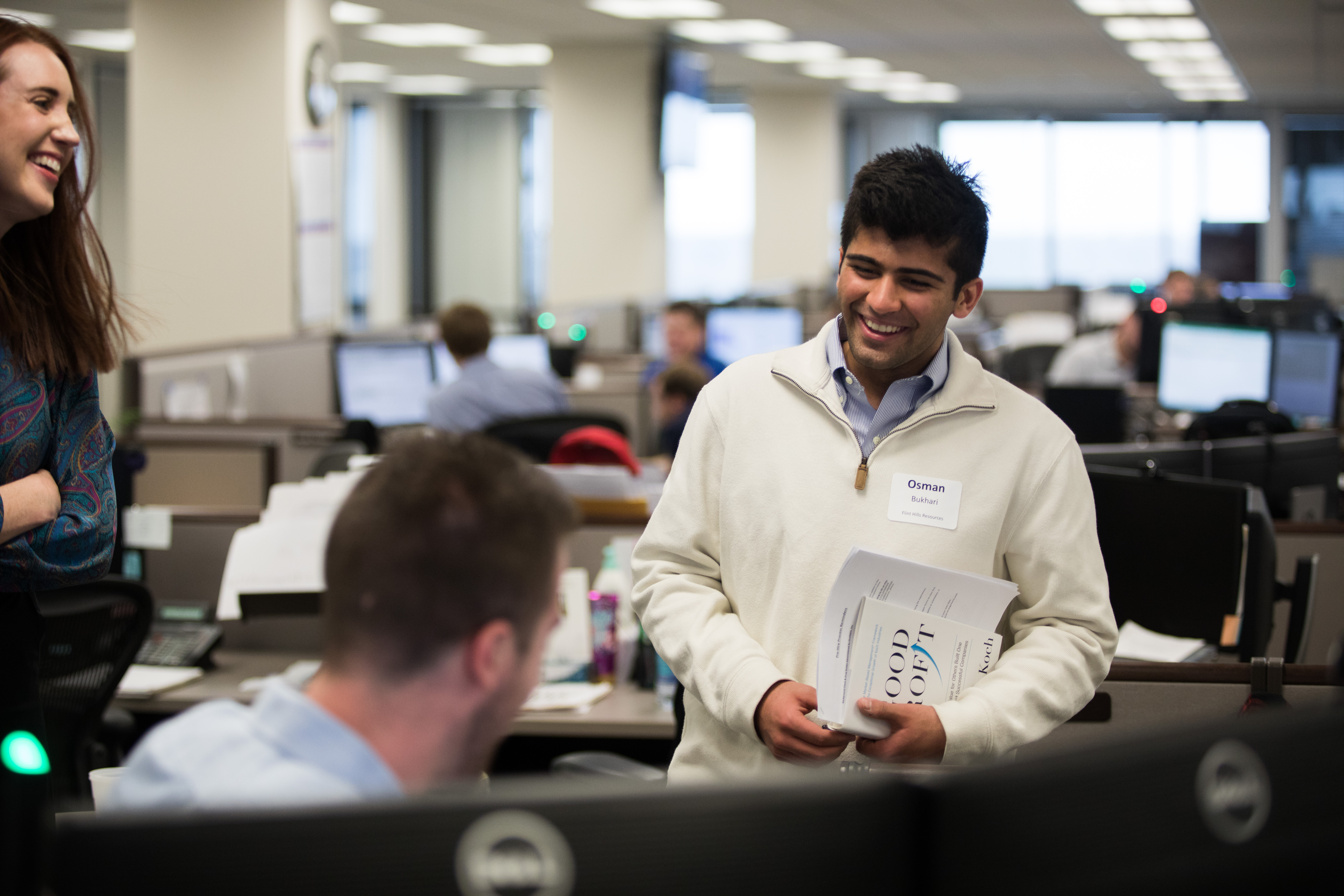ATTRACTING TALENT WITH WORKPLACE CULTURE
We've all seen the statue at Douglas and Main — the man reading the paper, barefoot, his shoes and briefcase sitting next to a nearby park bench.
It raises the question: What was his day like? What was his workplace like? And how has that changed since the statue was put in place in the late 1990s?
Workplace culture is in the middle of a shakeup, with low unemployment giving more leverage to employees, and pitting companies against each other to compete for talent, which has become harder to come by. So what are people looking for in a workplace environment? Is it a steady income with generous bonuses and incentives? A benefits package with plenty of time off and a matching 401k? What about bean bag chairs and a stocked fridge full of beer?
In Wichita, the way our companies treat their employees defines the types of people we'll be able to attract. If we don't provide a diverse range of business cultures, we can't attract a diverse range of workers — and we won't grow our workforce to the numbers we need to further attract new businesses.
If you own a company, it's important to know what you're up against — and what potential employees would like to see. Not every company needs to provide bean bag chairs and snacks. But every company does need to do what it can to ensure its workforce is valued and appreciated.
COMPETING WITH VALUE
At 3.9 percent, the United States unemployment rate is the lowest it has been since the 1960s. At 4.3 percent, Wichita's isn't much higher. And as of July, the number of job openings reached 6.9 million, meaning companies are looking for talent that is, more than likely, already employed.
This seems like a great thing — and in most cases, it is. But it really ramps up the competition between businesses trying to attract the same talent.

"A trend that we see globally is that talent has the power — the ball is in their court," says Léah Sakr Lavender, talent specialist at the Greater Wichita Partnership. "If they're not happy with what their employer has to offer, they can find a job easily because there is low unemployment, and there are more positions out there than people who are filling them."
A trend that we see globally is that talent has the power — the ball is in their court. If they're not happy with what their employer has to offer, they can find a job easily.Léah Sakr Lavender, Greater Wichita Partnership
In her position as talent specialist, Lavender works alongside recruiters and employers to promote Wichita to current and future employees and assist in talent recruitments and retention strategies. One example of that is through helping them find ways to foster employee engagement with the community. Ultimately, she helps sell Wichita to potential hires. And if more workers are interested in what Wichita has to offer, it makes it easier to recruit businesses in need of a good workforce.
According to some, Wichita can be a tough sell when you see the cities it's up against — New York, Chicago, Los Angeles, Des Moines, Omaha, Oklahoma City, the list goes on. All of these cities have businesses that need workers too. And people are more likely to pick up and move to New York — even without a job — than Wichita.
"The perception is that bigger cities are trendier because they have a wider variety of companies, but it's really more about company culture and the industry," Lavender says.
Some companies show appreciation by stocking snacks and having a company gym. Others show it by allowing employees to work from home. The common thread is that companies successful in attracting and retaining talent ensure their employees feel valued for the work they do.
Stan Smith, managing partner at Martin Pringle Law Firm, says he most often hears younger attorneys simply wanting a seat at the table.

"They seem to want a culture where they feel heard, where they can have input on decisions, where they feel part of a team," he says. "Whether it's a senior attorney, an associate, a paralegal, other staff members that are part of the team, we try to get everybody involved."
Smith has been thinking about workplace culture a lot as Martin Pringle prepares to move into a new space near the Spaghetti Works building on Douglas. With the ability to design a new space virtually from scratch, Smith says they wanted to make it right for the current workforce, as well as the future workforce.
"It's going to have a much more modern feel; it's going to be much more open; it's going to provide collaborative spaces; it's going to have integrated technology," he says. "Those things allow people to work in untraditional spaces."
With a garage door patio, and a more laid back third-floor work space, Smith says Martin Pringle will have much more flexible spaces to fit the needs of a more diverse workforce.
We're just really trying to embrace that 'get up, get around, move and work in areas and ways that best meet your unique needs.'Laura Hands, Koch Industries
Koch Industries has also evolved to accommodate a bigger range of workers. When you first walk into the headquarters building on north Hillside, it looks traditional — like a headquarter building you'd picture from the 1970s or '80s. But as you walk through the various spaces, some feel extremely open and modern. There are lounge areas with white boards and relaxed meeting spaces, a patio with full Wi-Fi connectivity and two distinct dining areas that look and feel like trendy restaurants.
Laura Hands is the community affairs director for Koch Industries, managing Koch philanthropy as well as community and employee engagement efforts. She says the space was designed with flexibility in mind.

"We're just really trying to embrace that 'get up, get around, move and work in areas and ways that best meet your unique needs,'" she says.
Across Koch, employees are brought into a culture based on market-based management, Charles Koch's business philosophy that encourages employees to think like entrepreneurs in their roles and make decisions independently. This allows employees to flow in and out of projects and roles based on their unique abilities to add value.

Koch Industries interns meet at the Koch headquarters in north Wichita.
Danielle Harmon is the college relations manager at Koch Industries, but she started as an auditor before moving into IT. After doing some volunteer recruiting, she finally moved into recruiting full-time and now manages the Koch internship program, which was ranked in the top 100 programs in the country by WayUp.

"As long as the opportunity exists and you're creating value, the opportunities are there for you to move," Harmon says. "Two people that have the exact same role may be doing something completely different in terms of what their true responsibilities and expectations are because it is catered a little bit more toward that person's comparative advantage."
Between Koch Industries, Martin Pringle and companies like Google and Facebook, which do have amazing workplace amenities, it's clear that there's no right or wrong way to do workplace culture as long as employees are left feeling valued for the work they do.
"Being valued and being cared for is number one," Lavender says. "But most people will tell you they want bean bag chairs and free food, right?"
TRENDS IN CULTURE
We tend to think of workplace trends in terms of geography and generation.
Silicon Valley, Austin, Seattle, Portland and Boulder all seem like places prone to more laid-back work environments. They show appreciation to their employees by offering flexible work schedules, wellness and fitness plans and the ever-present free food.
Places like New York and Chicago may seem a bit more uptight with traditional work schedules and highly competitive environments — think Wall Street, or the top law and consulting firms.
But Lavender says Silicon Valley standard bearers like Google and Facebook, which offer nap rooms, free concert tickets and (again) free food, don't do much better in employee surveys than top consulting groups like Bain and Boston Consulting Group, which are more traditional with long work hours and constant client requests.
"They're voted at the top nationally because people can see career growth," she says. "People can see they're being invested in their professional development and people can feel valued in the team they work for."
In the Midwest, we're often seen as being neither of these environments — or perhaps a mix of these environments. We might have some startups, or we might have some more traditional companies. Lavender says workplace trends are more accurately tracked by industry than by geography, so the more diverse we can make Wichita's businesses, the more diverse we can make its workplaces.
The other way we look at workplaces is by generation. We tend to think of millennials as wanting more flexible schedules and a beer fridge and think of gen-xers and baby boomers as wanting a more traditional work environment with better pay and a matching 401k. But really, every individual — regardless of generation — just wants to work how they prefer to work.
If they're doing a good job, meeting client expectations, frankly, if they're meeting their billable hours, it doesn't matter where they're doing it.Stan Smith, Martin Pringle Law Firm
"Ultimately, it's more about the personality of the person," Lavender says. "I have friends in San Francisco who have the option of working from the beach if they wanted to with their laptop, and they choose to sit at a desk because that's how they're more productive."
Instead of workers wanting specific things based on geography or generation, they really want a flexible work environment that offers a diverse range of ways to be productive.
Smith says Martin Pringle has evolved over the years to accommodate this type of flexibility, especially when it comes to working remotely in order to balance life and work.
"If they're doing a good job, meeting client expectations, frankly, if they're meeting their billable hours, it doesn't matter where they're doing it," he says. "Just because somebody is not in their office, that doesn't mean they're not working."
Flexibility and accepting a diverse range of life situations can also be seen in benefits like parental leave, paid time off and mentorship programs.
Parental leave in particular is vital for supporting working mothers and fathers as they work to blend their careers with parenthood.
"It sends out the message of 'I really care about your life and your future, and we're going to work around what you need,'" Lavender says. "If you're empowered, and happy, and valued, then you're going to be more productive. And ultimately, what every single employer wants is for their employees to be productive."
A MINDSET OF CHANGE
With workplace trends constantly in flux, it's vital for our companies to keep up. If we can't compete with other businesses in other cities, we can't cultivate a strong workforce and grow as a city.
Fortunately, Lavender says businesses and community leaders are already moving in the right direction and asking the right questions.
"There's an openness to consider changes in policy," she says. "Change will occur at different speeds, at different rates in different organizations. So not everyone is going to change the same way, but people are still asking those questions."
Organizations not asking those questions, testing out workplace changes and looking for a way to attract and retain better talent are likely not going to succeed in this highly competitive, highly mobile environment.
I don't remember a time that there hasn't been that flexibility. We're constantly trying to evolve and transform.Danielle Harmon, Koch Industries
For some companies, shifting into this mindset could be a major disruption for the way they handle employees. For others, like Koch, constant change in reaction to market — or employee — wants and needs is just how it has always been.
"I don't remember a time that there hasn't been that flexibility," Harmon says. "We're constantly trying to evolve and transform."
And for the organizations embracing this mindset today, Lavender is confident they will be embracing it tomorrow to constantly stay on track with changing trends.
"I think once you create a leadership or a management team that is asking those questions, that's the biggest win," she says. "Because what works today may not work tomorrow. It's great to celebrate our victories and the great programs that we're having, but we need to constantly evolve and ask, 'What is it that our talent wants?'"
The Human Capital Challenge is one of the starkest challenges Wichita faces. While other communities like Des Moines, Omaha and Oklahoma City are gaining people at a rapid pace, Wichita is losing people. Shifting our thinking on workplace culture can attract new people to Wichita while showing appreciation for those already here.
